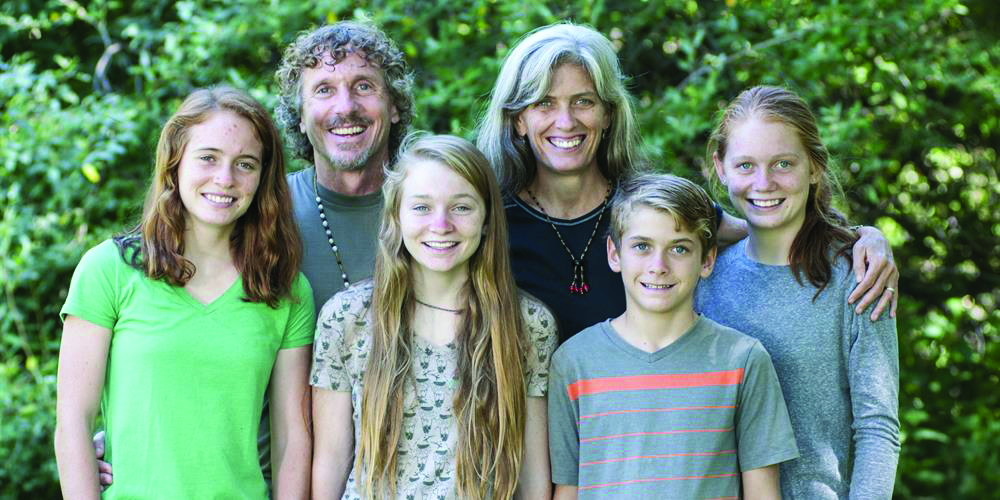One might expect to become a collector of stories if they live half of their life in another country each year.
Goshen College Economics professor Jerrell Ross Richer is one such man. Jerrell, his wife Jane, and their four children, Sierra, Naomi, Teresa and Jordan have spent three years living half of each year in Ecuador.The family works with Mennonite Mission Network and lives in the eastern rainforest region with indigenous people and works the Ecuadorian Mennonite church. Richer and his family are in Goshen for now, but plan to head back to Ecuador by late December.
The Ross Richer’s do accompaniment work with the indigenous Cofán community when in Ecuador.
This means that they are there to learn, support, and walk alongside indigenous pastors and community members.
The Cofán community consists of about 2000 people and Richer plans for students to spend time with these people in his Economics in Ecuador May-term class.
Because of this style of service, the family is full of stories, insights and challenges to share.
Richer shared a recent story from Ecuador about hunting and gathering with his son Jordan and a young Cofán boy named Michael that proved he is stronger than he looks.
Jordan and Michael had just hunted white lipped peccary, which Richer compared to wild pigs. The rainforest gets dark early so the two boys were unable to bring their hunt home with them, so early the next morning Richer was invited to come help collect the kill.
“They bound this 60 to 80-pound peccary with vine rope and they put it down in front of me with the bottom end up. Michael helped me to get it over my head and I had the whole animal on my back. I couldn’t believe that there were still people who lived this way,” Richer said.
Richer uses this story to show that the idea that indigenous people are lost to history isn’t quite true.
“Here were these hunters and gatherers. It felt like going back in a time machine,” Richer said.
Richer shared that without his entire family he doesn’t believe his experience with the Ecuadorian people would be the same.
“I have trouble imagining doing the type of work we do without our children,” Richer said.
The more traditional missionary lifestyle was unattractive to Richer, as he felt it was quite divided. The father would be out in the jungle with the mother at home, while the children attended boarding school.
But for the Richer family, Ecuador is experienced together, not apart. The Cofán people of Ecuador value the family unit.
Richer explains that his interactions with Cofán adults would have been different if his children had not been present.
“Our kids make friends and learn the language a lot faster,” Richer said. “They get into the culture faster too.”
Richer believes that time off screens is the “real world.” As a father he is glad his children are experiencing an off-the-clock “real world” through bare-feet, river swimming, and banana drink-making in Ecuador.
One challenge Richer spoke on was defining what it meant to be Cofán and Christian.
Although indigenous, the Cofán people realized they cannot completely cut out other influences. For example, Richer said that he walked into a Cofán church with chairs all facing forward.
After being asked if this is truly how they would worship, the Cofán leader said, “Definitely not. We would sit in a circle so that everyone is equal with each other. But this is what we saw the North Americans do in church so we did it too.”
One of Richer’s hopes for the Cofán people is that they are able to develop their own sense of what being a Christian means to them.
“We are helping them to be Cofán Christians. Not North American Christians,” said Richer. As the Cofán continue to develop their own identity within Christianity they hope to preserve language, equality between sexes, and their non-materialistic values.
In Ecuador the Richer family can be found sitting quietly with the Cofán people who don’t feel the need to fill silence with small talk. Or maybe they’ll be talking about the important topic of what fruit is in season, and living a relaxed, off-the clock life. Whatever they are doing, it’s fair to say Jane and Jerrell, Sierra, Naomi, Teresa and Jordan will probably be doing it with the intent of learning from and walking with his Cofán brothers and sisters.
This May-term, Goshen College students can collect some stories of their own from Ecuador through Richer’s class: Economics in Ecuador. The class will examine the Cofán’s generous and sustainable lifestyle, while also grappling with the impact of low incomes and destruction of the rainforest for Cofán people.



